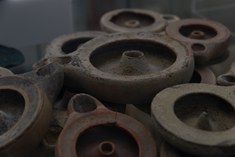GICS roundtables
The GICS roundtables are discussion panels on specific topics combining ancient and modern critical and theoretical perspectives.

UPCOMING ROUNDTABLE!
Encountering Environments: Classics & Ecocriticism
A roundtable with Ursula Heise (UCLA/UGent), Alison Sharrock (Manchester), Aaron Kachuck (Louvain-La-Neuve) and Giulia Sissa (UCLA), organized by Marco Formisano and Leila Williamson (UGent)
November 14th (5-6:45pm CET), Faculteitszaal, Blandijnberg 2, Faculty of Arts and Philosophy, Ghent University
In recent years ecocriticism has increasingly attracted the attention of an astonishingly wide range of classicists. It seems that Classics as an academic discipline, even within its more conservative scholarly traditions, has embraced the hermeneutic possibility offered by the consideration of the environment in ancient Greek and Latin texts. And yet, as the title of this event is meant to highlight, there is something disturbing in this encounter between the philological-historical discipline par excellence, Classics, and an environmental criticism that puts at the core of its investigation the more-than-human, thus insisting on the time of the environment rather than human history. Do we classicists feel the need to retrodate the advent of the Anthropocene to Greco-Roman antiquity in order to feel entitled to approach our texts in an ecocritical way? Or do we look for a literature of prefiguration or even allegory of our current environmental crisis? In any case it seems that the emergence of environmental critical discourses in the study of the ancient Mediterranean world cannot be viewed as just another hermeneutic tool. Rather, ecocriticism represents a totalizing way of reading that might require a radical revision of the very principles ruling the discipline.
Download the flyer with TEAMS link
Previous roundtables include:
- Listen, there is something you need to hear: a conversation about trees, ancient and modern
- On their own terms: a conversation about things, ancient and modern

- Did they know? A conversation about queer, ancient and modern
